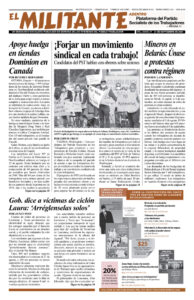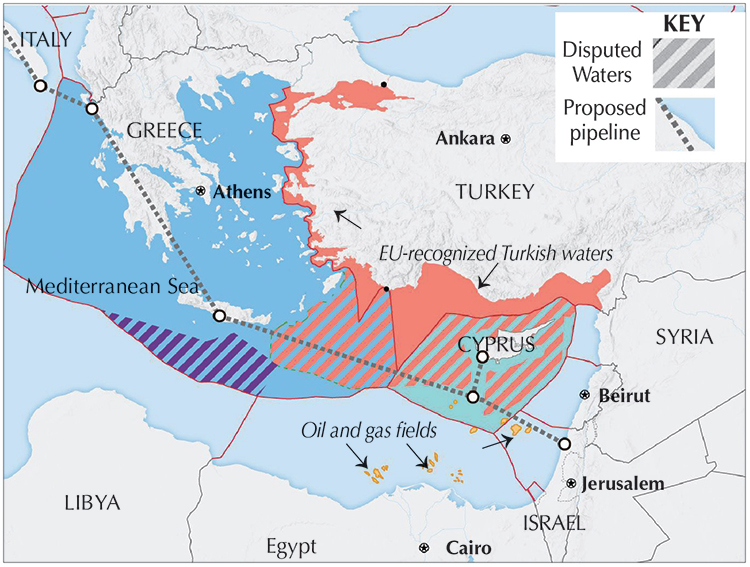Mounting competition and threats over the plunder of oil and gas resources between several rival capitalist powers across the eastern Mediterranean lies behind stepped-up clashes between the rulers of Turkey and Greece. These conflicts are exacerbated by pressure from the continuing slowdown in production and trade worldwide. And these same pressures draw the imperialist rulers in Paris and Washington to increase their intervention in the region.
Greek and Turkish warships bumped into each other in disputed waters Aug. 12, after the Turkish rulers sent a research ship, accompanied by frigates, to explore for oil and gas in seas claimed by Athens. The Greek government had deployed its own warships to the same area, less than 2 miles from Turkey’s southern coast.
These clashes also come as Ankara, Athens and other regional capitalist regimes are backing opposite sides in the bloody civil war in Libya. Long simmering territorial conflicts between the two ruling classes were stoked up when the Libyan government granted the Turkish rulers drilling rights off the coast of Libya in seas long claimed by Athens. In return, the Turkish government propped up the besieged Libyan government, sending it decisive military support in its civil war against Khalifa Haftar’s forces based in the country’s eastern region.
To counter Ankara’s new maritime claims, the Greek rulers Aug. 6 signed a deal with the Egyptian government, staking out Athens’ rights to the same waters.
Over the last decade large offshore natural gas fields in waters claimed by the rulers of Israel, Cyprus and Egypt have been discovered in the eastern Mediterranean. Along with U.S. and Italian oil company owners, capitalists from these countries have started drilling. Last year the East Mediterranean Gas Forum was founded by the governments of Cyprus, Egypt, Israel, Italy, Greece and Jordan. They excluded the Turkish government and project the construction of the EastMed pipeline to carry gas from Israel to Italy through parts of the ocean the Turkish rulers now say belongs to them.
“Nobody will try to sabotage” the pipeline, warned Israeli Energy Minister Yuval Steinitz.
Cyprus is a divided country. After the then ruling military in Athens organized a coup in Cyprus in 1973, Turkish soldiers invaded the next year and occupied the northern part of the country. Some 35,000 Turkish troops remain garrisoned there today, against the wishes of the majority of the country’s Greek-Cypriot population.
Today the Turkish government challenges the Cypriot government’s exploration for gas in their coastal waters. It argues that the Turkish population in occupied northern Cyprus can only benefit from the newly found oil and gas resources if rivals accept Ankara’s territorial claims to those waters.
U.S. rulers eye profits
Washington rejects Turkish government claims to the east Mediterranean reserves. The Pentagon announced in July it would start joint military exercises with Cypriot government forces. Last December Congress ended an arms embargo of Cyprus, which had been imposed in 1987 with the strong backing of the Turkish rulers.
Ankara launched its own military exercises off occupied northeast Cyprus Sept. 6. The day before, Turkish President Recep Tayyip Erdogan threatened Athens, saying, “They will either understand the language of politics and diplomacy, or on the field through bitter experiences.” Ankara is the only government worldwide that recognizes its puppet government of the Turkish Republic of Northern Cyprus.
European Union officials back fellow member Greece in its claims to the oil and gas fields, demanding the Turkish government stop its exploration in waters claimed by Athens. French government officials say the Turkish navy harassed a French warship taking part in NATO exercises in the eastern Mediterranean in June. Ankara denies the allegation and says Paris must stop “bullying” while acting as a “guardian angel.”
Moscow also maintains a sizable naval presence in the eastern Mediterranean and has recently expanded its military ties with the Turkish government.
Driving the Turkish rulers’ stepped-up pursuit of their territorial claims in the region are the plunging economic fortunes of the country’s capitalist class. Their currency, the lira, dropped to its lowest point ever against the dollar this summer, stoking inflation, which has fallen most heavily on working people. The number of Turkish workers forced out of the labor force because they’ve given up hope of finding work rose from just over half a million last year to 1.3 million today.


